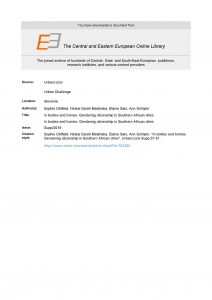Urbani Izziv
Co-authored by #UnequalCities Network Steering Committee member Sophie Oldfield
Summary: How do the everyday contexts in which ordinary women struggle to access and maintain a place on the peripheries of the city shape experiences of citizenship? This paper explores this question in George, a peri-urban Lusaka neighbourhood in Zambia and through experiences of Zimbabwean migrant women’s negotiation of a place on the peri-urban edges of Khayelitsha, Cape Town, South Africa. In the logics of citizen-subjects, the experiences of these groups of women should be poles apart, the first with rights imbued in citizenship, the second migrants without. Here instead, we demonstrate the ways in which gendered political subjectivities embed in the hard, lived realities of home. In placing gender and everyday body politics at the forefront of our analysis, the paper makes visible the micro-realities of making home. We demonstrate that an assumed recursive relationship between citizenship and home, as a physical and social place in the city, is problematic. Building on debates on citizenship and its gendering in post-colonial African urban contexts, we demonstrate instead that citizenship and its gendered contestations and emergent forms in Southern African are crafted in quotidian activities in homes and everyday city contexts.
Read >> In Bodies and Homes: Gendering Citizenship in South African Cities


